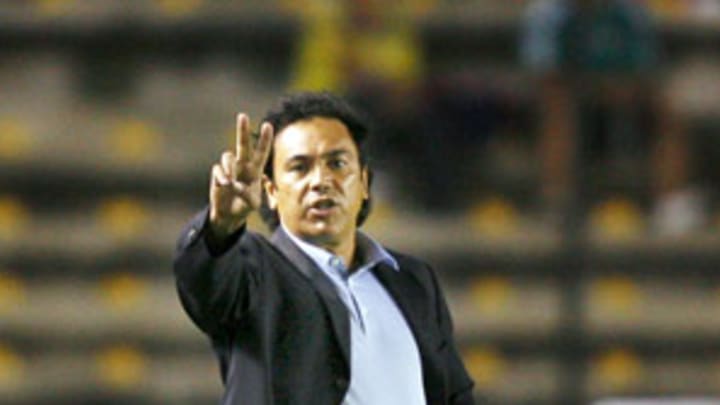Elite resume sets Sánchez apart

Sadly (or not), coaching candidates typically possess only two or three of these criteria. Hiring a coach in MLS follows the lines of that old business idiom: "Work can be done cheap, fast or good: Pick two."
But today, all of a sudden, there is someone out there who fits the mold to a T. If I were D.C.'s Kevin Payne or Dave Kasper, New York's Erik Solér or, especially, Chicago's Frank Klopas, I'd pick up my phone this morning and call this guy: Hugo Sánchez.
"Hugol" is on the market again after Spanish side Almería sacked him over the weekend. And the various MLS GMs looking for coaches would be fools if they didn't at least talk to him.
It starts with name recognition. Commentators are always saying MLS needs to attract more marquee names. Sánchez may not be as bold-faced as a José Mourinho or Fabio Capello, but he's got more star power than, say, Caleb Porter. And it's pretty well-deserved, considering his résumé.
Hugol famously won five Pichichis as the top scorer in the Spanish Primera División -- one with Atlético Madrid and four with Real Madrid. He also notched 29 goals in 75 appearances for Mexico. One of those goals, a header at the far post against Belgium at the 1986 World Cup, remains one of my earliest World Cup memories. It ignited the Azteca into this mesmerizing frenzy that I still remember.
Ten years later, Sánchez spent the 1996 season with the newly minted Dallas Burn. (Aside: Anyone else miss Islamico?) Hugol and the Big D weren't a match made in fútbol heaven, but he did score seven goals and have five assists in 25 games, including playoffs. This experience, despite being in the distant past, makes a difference. Unlike Ruud Gullit, Sánchez has at least some understanding of the American player and the league.
And, for what it's worth, that inaugural season still stands as the club's most successful at the gate, with an average attendance of more than 16,000. Sánchez's presence certainly had something to do with those numbers, and it points to his obvious marketing appeal: immediate identification with Mexican fans. The greatest goleador in Mexican history would certainly excite any team's Mexican and Mexican-American fan base and the Spanish-speaking press. This is particularly true in Chicago, where Cuauhtémoc Blanco has already energized local Hispanics.
During this year's playoffs, I stood outside Toyota Park after the Fire had dispatched the New England Revolution. The fans in the parking lot were in good spirits, of course, freely sharing their beer and tequila with an interloping journalist. When asked why they were Fire fans, they all gave the same reason: Blanco. Therefore, whoever takes the reins in Chicago better be able to relate to Blanco. Sánchez already does.
It was Sánchez who, after taking charge of Mexico in '06, brought Blanco back into the team. His predecessor, Ricardo Lavolpe, had stupidly dropped Blanco from the '06 World Cup squad, and Sánchez -- never an amigo to Lavolpe -- was all-too-happy to flip him the bird by recalling the popular striker.
With Blanco back in the side, Sánchez's Mexico reached the final of the '07 CONCACAF Gold Cup and would have won it were it not for a piece of brilliance from Benny Feilhaber. They then went down to Venezuela for the '07 Copa América, shocked Brazil in their opener, and finished in third place. Considering el Tri's underachievement in Germany in '06, the results of '07 were a step in the right direction.
But Sánchez's Mexico reign is shot through with controversy. Many say that Sánchez lacked the tactical nous required at the highest level and that the side had no cohesion. The biggest criticism, however, has nothing to do with soccer. His decision to replace Mexico's traditional green jersey with a white one because, he said, the green jerseys blended in with the green grass of the field, unleashed an astounding torrent of venom. Honestly, Sánchez wouldn't have been more excoriated if he'd desecrated a statue of Pancho Villa or opened a McDonald's in the Zócalo. Unsurprisingly, the first run of poor results brought the axe, in March '08.
Hiring Sánchez would be risky. His critics are legion and loud, and the question remains: Can he coach? In today's "What have you done for me lately?" era, his 363-day stint at Almería and his Tri (mis)adventure will convince some that the answer is no. But that ignores his successful five-year run in charge of Mexico City giants UNAM Pumas. After building the side for a few seasons, in'004, he led Pumas to back-to-back league titles. When given time -- and humility -- the 51-year-old obviously has the potential to do good things.
So what would those fans outside Toyota Park think of the hiring of Sánchez? I can only think they would raise their glasses of tequila and shout, "¡Salud!"
